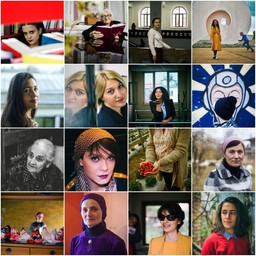Voice from Dedoplistskaro | ‘I dreamed of seeing a child protection hotline and calling it’

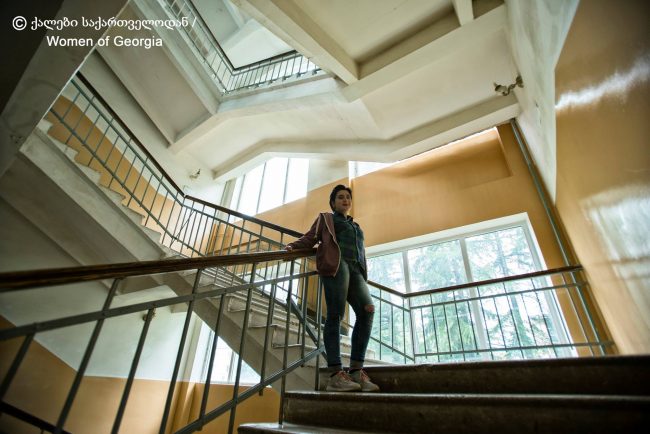
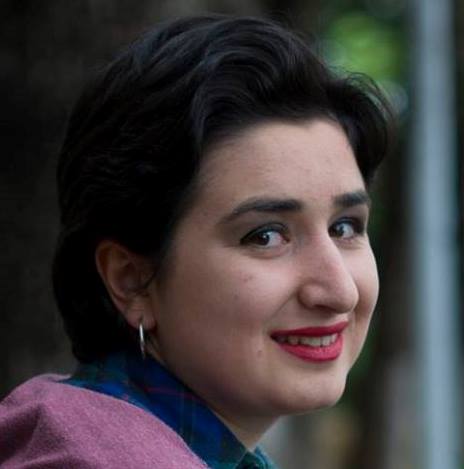 ‘I think that if a person really wants to do something, if it’s in their soul, they can do it. I’ve wanted to be independent since I was a child. I made several attempts at it. I escaped from home a few times. I don’t know why but since very early childhood, when I was so little, I already knew I didn’t want to live in that house, where they don’t love you and you don’t love them.’
‘I think that if a person really wants to do something, if it’s in their soul, they can do it. I’ve wanted to be independent since I was a child. I made several attempts at it. I escaped from home a few times. I don’t know why but since very early childhood, when I was so little, I already knew I didn’t want to live in that house, where they don’t love you and you don’t love them.’
Women in Georgia very often lack a voice of their own. Their opinions, feelings, dreams, aspirations, and achievements can be conveyed by others, often the men around them. The Women in Georgia project gives a voice to these women, allowing them to tell their own stories — in their own words. OC Media brings you a selection of these stories, translated into English and Russian. Here, in her own words, is Sopio Jeterishvili’s.
‘When I was only five, if I did something wrong, my father would kick me out into the street and I would have to spend the night outside. I remember once, it was raining when I had to spend the night outside. I think this was when it started. It started when I began to protest his actions, I confronted him and I didn’t like when he was doing bad things, I was always saying this out loud. It concerned my mother as well, when he was violent towards her. And of course when I tried to stop him, he was aggressive towards me too. In the end, he didn’t love me and I didn’t love him. We became people unacceptable for each other.’
‘Once, I remember my father had gone somewhere, and I was afraid that when he came back, he would beat me. So I decided to escape. I was 13 or 14 years old. It was winter, but I left barefoot, without making any noise. My mother had cooked dinner, but I didn’t even eat before escaping. My plan was to spend the night hiding somewhere and to go to the police the next morning. I dreamed throughout my childhood of seeing a child protection hotline number somewhere on TV and calling it.’
‘My father used both physical and psychological violence against me. Once, he slapped me in the face. We had guests over and I was angry at him for some reason. I decided to hide. He forced me to come out in front of the guests and he slapped me right in front of them. The worst was the psychological abuse, the threats, curses.’
‘Three years ago, my mother was pregnant and my father was violent towards her. He would argue with her, holding a knife in his hands. I protested against it. He kicked me out of the house. I hid in an abandoned house, it was winter back then too. I walked carefully in the streets so that no one could see me. I wanted to go to the police. Instead, I went to my mother’s parents and spent a week with them. Then my grandfather told me that they couldn’t afford to have me with them, that I had parents and they had to take care of me.’
‘When I came back, my father didn’t speak to me for a month. He viewed me as nothing, he would ignore me, he wouldn’t drink the water I would offer him. Then my brother was born. He finally spoke to me during a feast organised for my brother’s birth. The next two years were more or less peaceful.’
‘His actions weren’t those of a normal human’
‘It was my final year in school. I was getting ready for the national exams. My father was paying for extra classes, I can’t say that he is poor now or that he was poor back then. He had a fight with my mother. I had already made the decision not to get involved in the relationship of these two people, because there really was no point. He was banging his hands on the table, dishes were falling off of it. I didn’t get involved until it turned violent. I told my father that he was right, even though he wasn’t. But I asked him to calm down. My mother left the room. I blocked the door not to let him out. I, my two younger sisters, and my two-year-old brother were crying. Our father was looking at us and laughing. That was the moment I realised his actions weren’t those of a normal human. He came up to me and hit me in the face.’
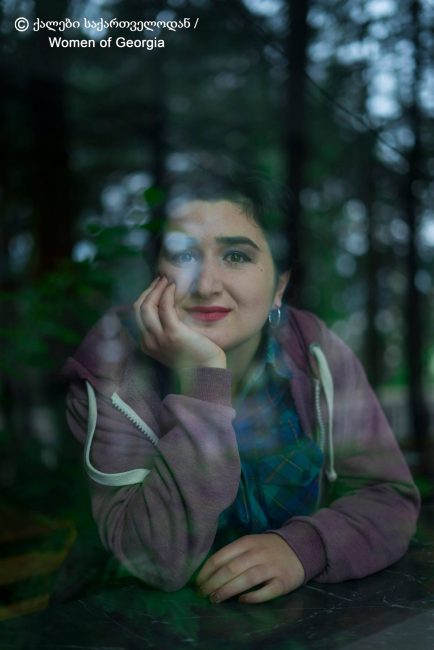
‘I went through the door to the garden, turned back, and told him I wouldn’t leave it like that, that I would go to the police. Of course my mother didn’t protest or say anything, she didn’t plan to leave the house. I didn’t want to go back. I went to the police. I always thought they would react properly, or that the law would have enough power to punish this person. The police officers told me instead that I was having a moment of temporary insanity and that it would be better if I didn’t file a complaint at that time. They issued a restraining order, nothing else, and told me that my anger would fade away. My mother didn’t support me either, when I wanted to file a complaint for physical violence after he hit me in face. The police officers told me, “It happens, so what? He is your father”. That’s how it ended. My mother, my little brother, and I went to grandfather’s. My sisters stayed with our father.’
‘It was around the time of New Year’s. I wanted to go to the village of Samtatskaro, to my great aunt’s. I wanted to take a short break from this bad environment. I needed some clothes. I went home, but my sisters wouldn’t let me take my clothes. They called my father. I had to call the police in order to get my clothes. When the New Year came, my sisters, who had been enemies to me just a couple of days before, were now congratulating me. I found out later that my mother had urged them to. She went back home while I was away. It was a hard thing to go through. When I got back to my grandfather’s, my mother and brother were gone. I was alone without any assistance or support. I didn’t know what to do, where to go.’
‘He almost killed me’
‘I wasn’t able to see my mother anymore. I felt alone. I lived with my grandmother, grandfather, uncle, aunt and two cousins. They accepted me. I never thought of going back, but my grandfather would tell me every day that I wouldn’t be able to study at university because they couldn’t afford it, and that I also had to get married… He would tell me to go home every evening. I didn’t want to go back home and my father didn’t want to see me either. He still talks about me as if I am dead.’
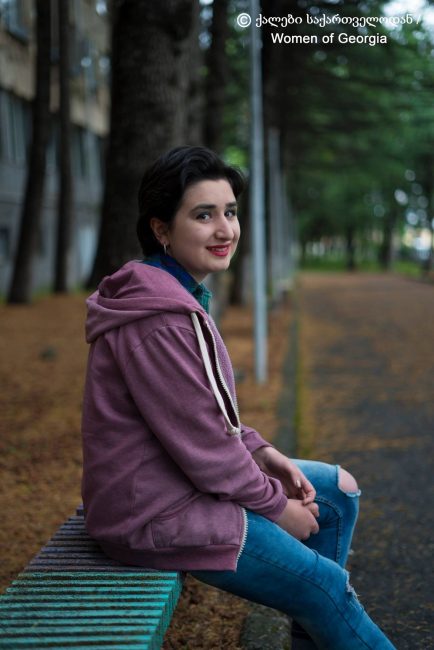
‘My siblings and I weren’t baptised, at the decision of my father. He’s Christian, but he doesn’t like keeping traditions. When I left home, the first thing I did was get baptised. I graduated from school. After my national exams, I started studying at Telavi University. Every day I feel like my power and strength are fading away, because every day when I go to the village, I cannot see my mother.’
‘When I first arrived in Telavi, I started looking for job. I went to the City Hall the very next day and got a job as a street sweeper for the next two months. Then it became colder, and things became complicated. At some point, I was working as a street sweeper and a waitress at the same time, on top of studying. I soon came to understand that Telavi University cannot give you a proper education, but if I don’t at least study what they offer there, then nothing will come out of it in the end. My grandfather thinks I’m working now and paying my own rent, but really my grandmother is secretly sending me money every month.’
‘I went home again in winter. I thought to myself: what could he do? But he almost killed me. He threw a hammer at me. I called the police. He told the police officers that I had been gone for half a year, that I had become a whore, and that he didn’t want to have me back now. When I went to the police station to file a complaint, my mother again failed to support me. She told me I was angry, that I didn’t have to do it, and that we had to ignore it. The police officer told me that the law doesn’t prohibit the way I live now, but that it might be unacceptable for my father. I left. I decided to go and visit my friend in Tbilisi, where nobody would know where I was.’
‘The most difficult part in all of this was the psychological stress, and very often I feel quite hopeless. When I told my story to friends at university, their reaction wasn’t quite what I had expected. A lecturer even told me that I shouldn’t tell such stories publicly. But I think it’s wrong. Maybe there is nothing special about my story, but people should know the abusers around them.’
This article is a partner post written by Nino Gamisonia. The original version first appeared on Women of Georgia, on 6 June 2018.


